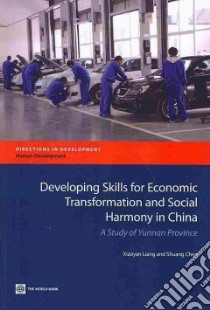Developing Skills for Economic Transformation and Social Harmony in China - 9781464800795
Un libro in lingua di Xiaoyan Liang edito da World Bank, 2013
- € 28.10
- Il prezzo è variabile in funzione del cambio della valuta d’origine
The World Bank has a long history of investing in China’s technical and vocational education and training (TVET), dating back to the 1963 Higher Education Project, which benefited selected tertiary TVET programs in project schools. The initial World Bank projects for TVET in China were designed mostly on the national level, supporting selected institutions in multiple provinces.Starting in 2006, based on strong analytical work and increased demand from various provinces, the World Bank began a direct policy dialogue with interested provinces, and in turn started supporting provincial level projects in TVET. These include the Guangdong Technical and Vocational Education Project and the Liaoning and Shandong Technical and Vocational Education Project, both of which are currently under implementation.Located on the southwestern border of China, Yunnan is a medium-sized Chinese province with abundant natural resources and high levels of ethnic diversity. Although Yunnan is still one of the poorest provinces in China, it has experienced rapid economic growth rates over the last decade and is expected to maintain an annual growth rate of 10 percent or higher. The recent national Bridgehead Strategy has further positioned Yunnan as a strategic gateway in the Southwest region, providing tremendous new opportunities for its development.The study is aimed at facilitating policy development leading to a demand-driven, high-quality, and equitable education and training system conducive to lifelong learning. The experience of Yunnan also sheds light on skills development in China, as the analysis in this report situates Yunnan in the broader national context. The intended audience includes policymakers in the Ministries of Education, Human Resources and Social Security, Agriculture, and Finance, and the Poverty Alleviation Office and National Development and Reform Commission. The report would also be of interest to researchers and development workers interested in understanding skills development in China.
Informazioni bibliografiche
- Titolo del Libro in lingua: Developing Skills for Economic Transformation and Social Harmony in China
- Sottotitolo: A Study of Yunnan Province
- Lingua: English
- Autore: Xiaoyan Liang
- Editore: World Bank
- Collana: World Bank (Paperback)
- Data di Pubblicazione: 14 Novembre '13
- Genere: BUSINESS and ECONOMICS
- Argomenti : Occupational training China Yunnan Sheng Vocational education China Yunnan Sheng Manpower policy China Yunnan Sheng
- Pagine: 179
- EAN-13: 9781464800795


